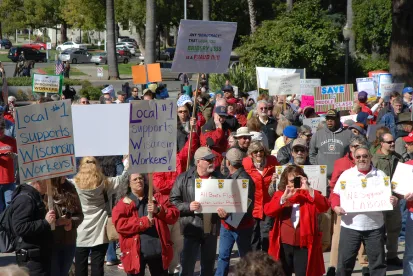The National Labor Relations Board has reminded employers that they must tolerate a certain degree of heated discourse during a union organizing campaign before discipline or termination may be warranted.
On June 27, 2019, the Board, in Pacific Green Trucking, Inc., 368 NLRB No. 14, ruled that a union organizer was unlawfully terminated for his union support and organizing activity, not, as the company asserted, for “fighting” with coworkers.
Although the employment “at will” doctrine generally allows employers to terminate an employee (and allows an employee to quit) for any reason, or even for no reason at all, the National Labor Relations Act protects most private-sector employees from discrimination or retaliation for engaging in protected concerted activity under Section 7 of the NLRA, such as engaging in union organizing.
The employee allegedly was spearheading an organizing effort. He alleged that he was interrogated, treated less favorably, and ultimately terminated because of his union activity, in violation of the NLRA.
The Board invoked its familiar Wright Line doctrine to examine whether the employer’s legitimate, non-discriminatory reason for terminating the union organizer (“fighting”) was a mere pretext for anti-union animus.
After the Board found that the company’s manager knew of the employee’s union organizing activity, it inferred anti-union animus from the manager’s statement that he “knew [the employee] was with the Union” and that the employee “shouldn’t do that” because the company “was giving [the employee] work” – comments the Board considered an implicit threat of job loss. It also found the statement to constitute an unlawful interrogation because it implicitly called for the employee to confirm or deny the statement.
The Board also found the manager’s reference to “fighting” an unlawful “euphemism for discussing or debating the union,” citing several other Board cases referring to similar euphemisms for union activity, including referring to an employee as a “problem person” or an “instigator.”
Thus, absent specific evidence of physical violence, and considering what it already had found to be unlawfully threatening and coercive statements toward the employee, the Board found the employee’s termination unlawful. The Board found further support for its decision in the fact that the company did not contest the employee’s unemployment claim. This suggested to the Board that the company did not sincerely believe the employee was terminated for cause, or that he had quit.
This case provides valuable lessons for employers experiencing union organizing, including:
-
A statement by a manager to an employee that the manager “knows” the employee supports the union may be unlawful interrogation, because the statement implicitly call for the employee to confirm or deny it;
-
Enforcement of workplace civility rules and policies against “fighting” with coworkers, without reliable evidence of actual (or credible threats of) physical violence, may be found to be evidence of unlawful “code” for anti-union discrimination;
-
Failure to oppose an employee’s unemployment compensation claim may give rise to an inference by the NLRB that the employee did not quit or was not terminated “for cause.”
Regardless of an employee’s “at-will” employment status, employers must be cautious before disciplining or terminating an employee during any stage of a union organizing effort. Consult your experienced labor and employment attorney for guidance.





 />i
/>i


